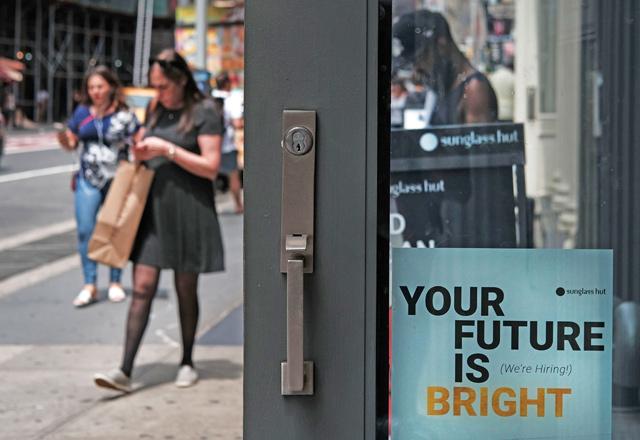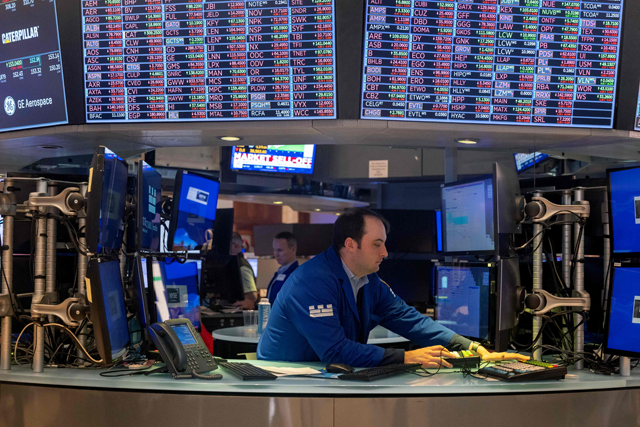You are here
US job creation cools in August as Trump hammers Fed
By AFP - Sep 07,2019 - Last updated at Sep 07,2019

In this photo taken on July 5, a hiring sign is displayed in a business window along a shopping street in lower Manhattan in New York City (AFP file photo)
WASHINGTON — America's jobs engine downshifted in August as employers unexpectedly held back hiring across major industries, another sign that the world's largest economy is cooling off, government data showed on Friday.
As the numbers were released early on Friday, President Donald Trump, whose record as a job creator could pale ahead of next year's election, renewed his attacks on the US central bank, which he blames for failing to stimulate the economy fast enough.
The surprisingly soft result confirmed that labor markets in 2019 have slowed from their brisk pace last year, amid a protracted trade dispute with China that has dragged down global commerce, fuelled business uncertainty and driven US manufacturing into recession.
Employers added a still-solid 130,000 net new positions for the month, far lower than analyst forecasts, while the jobless rate held steady at 3.7 per cent for the third month in a row, according to Labour Department estimates.
Figures for May and June were also cut by a total of 20,000 positions, bringing the rolling, three-month average to 156,000, well below the 241,000 seen in August last year.
The report did bring some good news, however: Wages continued to rise, suggesting consumer spending — which is almost single-handedly supporting US economic growth — will continue.
The share of the working-age population with a job rose to its highest level since the depths of the Great Recession in December 2008.
"The softening in job growth should surprise no one. But it doesn't mean the economy is headed toward a recession right away," economist Joel Naroff told clients in a note.
Economists on Friday also pointed out that August numbers are frequently revised upward in later months.
Amid weak investment by companies and mounting fears of a recession, employers also say they are struggling to find qualified workers to fill open positions.
'Oh, well...'
The slower jobs numbers should also support a Federal Reserve (Fed) decision later this month to cut interest rates, as markets widely expect it will do for the second time this year.
Late Thursday and early Friday, Trump took to Twitter to fire off the latest of many attacks on the US central bank, which he said had raised interest rates too quickly last year.
"They were WAY too early to raise, and Way too late to cut — and big dose quantitative tightening didn't exactly help either," said Trump, who has advance access to the jobs report before its public release.
"Where did I find this guy Jerome?" he said, referring to Fed Chairman Jerome Powell, whom he prompted to central bank chairman.
"Oh well, you can't win them all!"
Speaking on Friday at the University of Zurich, Powell said he and fellow policymakers tuned out Trump's political taunts.
But Powell welcomed the report's figures on rising wages.
"Our labour market is in quite a strong position. For a year and a half, we've been at half-century lows in unemployment," he said.
"I think today's labour market report is very much consistent with that story."
Workers got a bump in pay, as hourly wages rose 11 cents on average, putting them up more than 3 per cent, year-on-year, for the 13th month in a row.
But within the August jobs details there were other causes for concern.
About a quarter of August hires came from the government itself as federal authorities ramped up staffing to conduct next year's census.
Private-sector employers added only 96,000 jobs in August, well below the 145,000 which economists had forecast.
In the dominant service sector, the retail, transportation and utilities industries all shed jobs for at least the second month in a row.
Work forces also shrank in the mining sector, likely suffering from a dip in oil prices.
Hiring was cut in half from July in the education and health industries and was flat for auto manufacturers and information services as well as leisure and hospitality.
Wall Street appeared unimpressed with the numbers. The Dow Jones Industrial Average was up about 0.3 per cent.
Related Articles
WASHINGTON — When the leader of the Federal Reserve speaks, the world listens.
PARIS — Global stock markets have been in panic mode since last week, when a weak US jobs report triggered something called "the Sahm Rule",
WASHINGTON — The Federal Reserve (Fed) opened its two-day policy meeting on Tuesday, with investors around the world awaiting a signal on wh

















